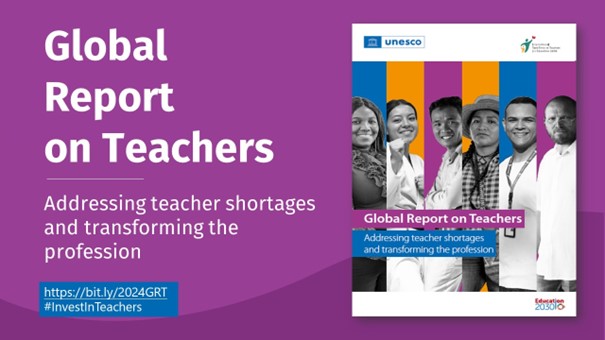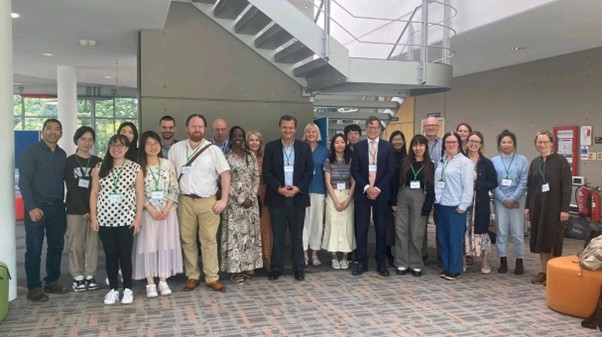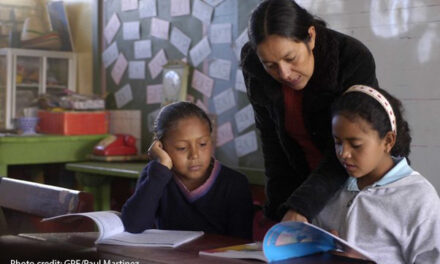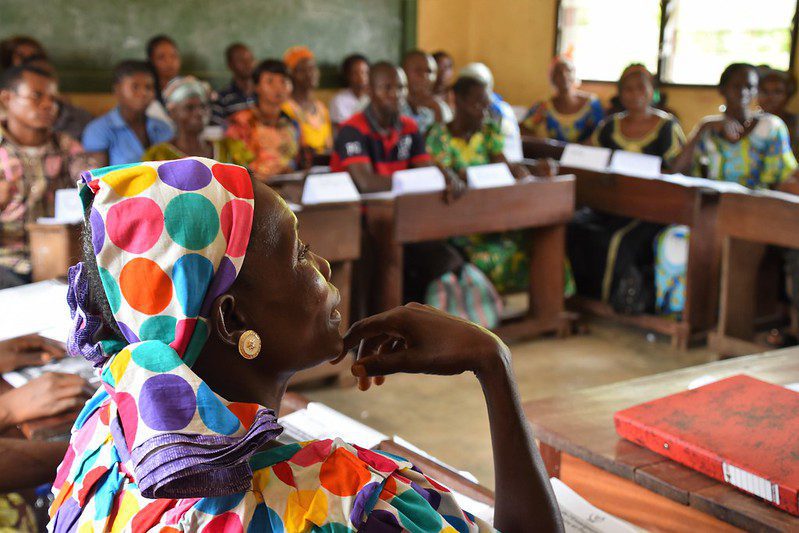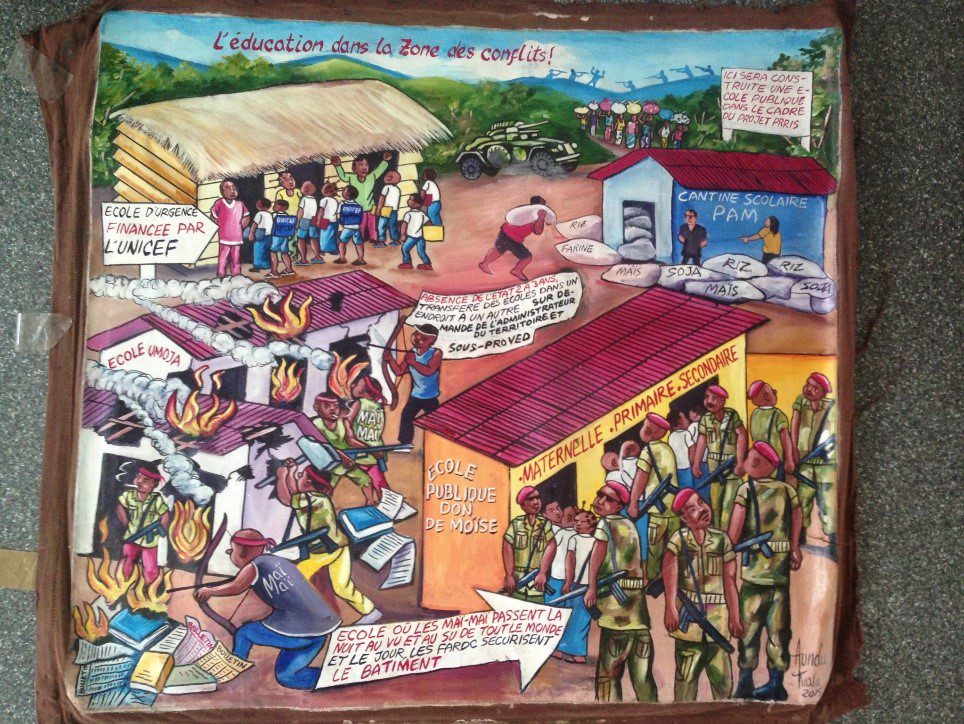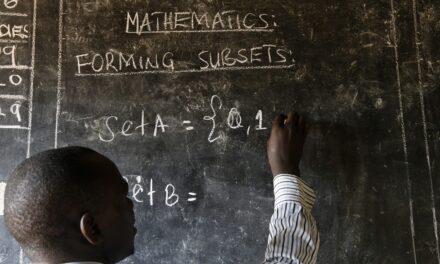In June 2024, UKFIET hosted a launch of the first Global Report on Teachers, produced by UNESCO and the International Teacher Task Force for 2030. Save the Children’s Sophie Lashford, who advocates for refugee teacher inclusion, reflects on the report’s major findings on crisis and displacement settings and her main takeaways from the day’s discussions.
As children across the UK are busy writing thank you cards to their teachers to mark the end of another school year, UNESCO’s latest findings on the global teacher shortage are particularly stark. The inaugural global report on teachers with the International Teacher Task Force for 2030 illuminates serious global teacher shortages and worsening teacher attrition around the world, and what that means for our progress towards global goals on education. The report estimates that 44 million additional teachers are needed if we are to reach our Sustainable Development Goals on achieving universal primary and secondary education by 2030. The largest driver of this shortage is teachers dropping out of the profession at a rate that has doubled between 2015 to 2022. It brings into clear focus that attracting and retaining teachers is key to ensuring all children receive a free, equitable and quality education.
The report explores the root causes of teacher shortages at the global level, with concrete recommendations and examples of good practices in responding to them. Digging deeper, there is also a specific look at situations where the challenges faced warrant special attention. For crisis and displacement contexts, the report echoes our own Save the Children research and experience that these are the settings where the challenges in training, recruiting and retaining teachers are the most acute and the conditions for teachers are most demanding. Many of the event participants had a particular interest in these contexts and we delved into these further in our breakout sessions in the afternoon. Amongst these findings and discussions, there are four takeaways to share:
- Teaching in crisis contexts brings common but intensified challenges. The report explores the fact that crisis and displacement often exacerbate pre-existing resource-related challenges that put pressure on teachers in low- and middle-income countries. Teachers therefore, contend with large class sizes, severely limited resources, and little to no opportunities for professional development. The evidence reviewed shows the negative impact on teachers’ motivation and wellbeing, and makes the link to teachers leaving the profession.
- Safety and security risks weigh heavily on teachers in refugee and crisis settings. Teachers face serious risks in the classroom and on their way to work, including gender-related violence. The report highlights the evidence that these safety risks lead to low motivation to stay in the profession and increased chances of burnout. In combination with poor sanitation provision in schools, the threat of violence and harassment also leads to difficulty retaining female teachers, which in turn has implications for the willingness of communities to enrol girls in school.
- Mental health and wellbeing are key ingredients of any work with refugee teachers. Teachers in crisis and displacement settings take on additional responsibilities to provide psychosocial support to learners and their families, and teachers in these contexts have often experienced displacement and trauma themselves. Support for teachers must recognise and respond to this to effectively tackle the challenges they face.
- Unequal working conditions and payment for teachers in crisis and displacement settings have significant impact. There is an array of arrangements for contracting, compensation and qualifications of teachers in crisis and displacement settings and the report highlights the reliance on funding availability, system capacity and the inclusivity of the policy environment. This has significant impact for teacher retention. Recent research highlights that discrepancies in salaries and benefits cause demotivation and frustration amongst refugee teachers.
The report’s overarching recommendations are to address teacher shortages and transform the profession through enhanced professional development and working conditions, and a new social contract to reset the status of the teacher. As we discussed the implications of this for our practice through the day of the conference, I reflected on how these recommendations are both as vitally important in situations of crisis and displacement, and how important it is to support local and government actors to implement them on the ground with contextually-appropriate measures and predictable, sustainable financing.
But perhaps just as insightful are the themes that run throughout the report of giving teachers more agency, involvement in decision- and policy-making and a greater voice. As we grapple with knotty policy problems, refugee teachers, as experts by experience, hold the insights to unravel many of these issues. Critically, increased participation can also have an impact on teacher wellbeing, motivation and ultimately, retention in their important roles. As one teacher themselves reflected to Save the Children:
“No-one is more capable of setting out what needs to change to improving teaching than teachers themselves. Teachers have the best experience of what they need, want and expect in order to do their job. Teachers must be able to take part in national, district and school level policy discussions in a meaningful way.”
At Save the Children, we are using the best evidence as we work on improvements to teacher professional development and wellbeing. Most recently with the support of the LEGO Foundation we are working with local partners in Kenya to promote the inclusion of refugee teachers in the national system. At the very heart of this work will be centring the voices of refugee teachers, working in partnership with them to enhance the policies that impact their profession, whilst addressing the sustainable and predictable financing necessary for their inclusion.
We hope to learn from our work in Kenya and share this across other refugee-hosting contexts. Teachers are the very foundation of providing all children with a safe, quality and inclusive education – and we know that this is even more essential for children at times of crisis.

